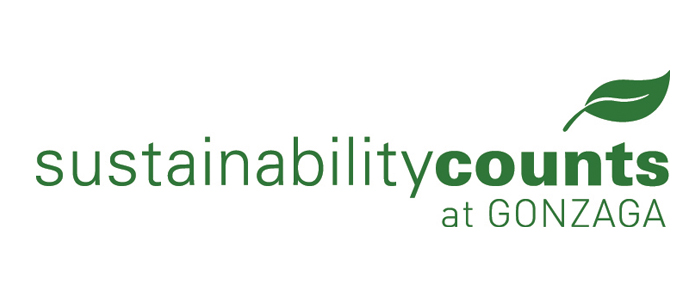Gonzaga is playing an active role in ensuring that the next generation finds our world as or better than we left it. We do this not just because “sustainability” is a buzzword of the 21st century. We do it because sustainability is at the core of the St. Francis Pledge to Care for Creation and the Poor, which University President Thayne M. McCulloh, D.Phil., signed on October 7, 2013. This pledge affirms Gonzaga’s recognition of the impact that our actions and preventative efforts could have on others around the world. Dr. Brian Henning, Co-Chair of the Advisory Council on Stewardship and Sustainability (ACSS), adds that Gonzaga’s mission clearly aligns with the tenets of responsible ecological stewardship where it states that,
“The Gonzaga experience fosters a mature commitment to dignity of the human person, social justice, diversity, intercultural competence, global engagement, solidarity with the poor and vulnerable, and care for the planet.”
“As a Catholic Jesuit university, stewardship of our natural world is not a fad or an appendage. It is a moral duty,” Dr. Henning added.
Making the pledge and putting it into practice, Gonzaga has taken several steps toward identifying and implementing sustainable practices campus-wide. Dr. McCulloh made the commitment through Gonzaga’s first Climate Action Plan (signed in 2012) to reduce the environmental impact of Gonzaga operations from 2009 levels by 20% by 2020 and 50% by 2035. The plan also included ways to integrate principles of sustainability and environmental justice across Gonzaga’s curricula. You can learn more about the Climate Action Plan here: gonzaga.edu/climateactionplan.
Gonzaga has polices in place that guide purchasing and design decisions toward sustainability as well. These policies include criteria for conservation of energy and water, minimization of toxins and pollutants, the use of bio-based products, recycling, building construction, landscaping, food services and more. View the Gonzaga Sustainable Purchasing & Design Policies in their entirety.
The moral duty that we share in seeking sustainable solutions to everyday ecological impacts is part of Gonzaga’s goal of graduating the students the world needs most. As Dr. Henning put it,
“The world needs men and women for others, who see and seek to address the ecological crisis. With the support of our alumni and benefactors, Gonzaga has the potential to be a regional leader in this important work.”
